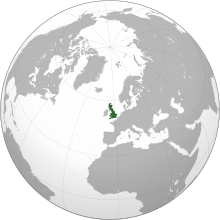
Satellite image, 2002
| |
 | |
| Geography | |
| Location | Northwestern Europe |
| Coordinates | 53°50′N 2°25′W / 53.833°N 2.417°W |
| Archipelago | British Isles |
| Adjacent bodies of water | Atlantic Ocean |
| Area | 209,331 km2 (80,823 sq mi)[1] |
| Area rank | 9th |
| Highest elevation | 1,345 m (4,413 ft) |
| Highest point | Ben Nevis[2] |
| Administration | |
| Countries | England, Scotland, and Wales |
| Largest city | London (pop. 8,878,892) |
| Demographics | |
| Population | 60,800,000 (2011 census)[5] |
| Population rank | 3rd |
| Pop. density | 302 /km2 (782 /sq mi) |
| Languages | English, Scots, Welsh, Scottish Gaelic, Cornish |
| Ethnic groups | |
| Additional information | |
| Time zone | |
| • Summer (DST) | |
The island is dominated by a maritime climate with narrow temperature differences between seasons. Politically, Great Britain and Northern Ireland together, constitute the United Kingdom.[11] Most of England, Scotland, and Wales are on the island. The term "Great Britain" is often used to include the whole of England, Scotland and Wales including their component adjoining islands; and is also occasionally but contentiously applied to the UK as a whole in some contexts.[12]
A single Kingdom of Great Britain resulted from the union of the Kingdom of England (which had already comprised the present-day countries of England and Wales) and the Kingdom of Scotland by the 1707 Acts of Union. In 1801, Great Britain united with the neighbouring Kingdom of Ireland, forming the United Kingdom of Great Britain and Ireland, which was renamed the "United Kingdom of Great Britain and Northern Ireland" after the Irish Free State seceded in 1922.
Contents
Terminology[edit]
Toponymy[edit]
The archipelago has been referred to by a single name for over 2000 years: the term 'British Isles' derives from terms used by classical geographers to describe this island group. By 50 BC Greek geographers were using equivalents of Prettanikē as a collective name for the British Isles.[13] However, with the Roman conquest of Britain the Latin term Britannia was used for the island of Great Britain, and later Roman-occupied Britain south of Caledonia.[14][15][16]The earliest known name for Great Britain is Albion (Greek: Ἀλβιών) or insula Albionum, from either the Latin albus meaning "white" (possibly referring to the white cliffs of Dover, the first view of Britain from the continent) or the "island of the Albiones".[17] The oldest mention of terms related to Great Britain was by Aristotle (384–322 BC), or possibly by Pseudo-Aristotle, in his text On the Universe, Vol. III. To quote his works, "There are two very large islands in it, called the British Isles, Albion and Ierne".[18]
The first known written use of the word Britain was an ancient Greek transliteration of the original P-Celtic term in a work on the travels and discoveries of Pytheas that has not survived. The earliest existing records of the word are quotations of the periplus by later authors, such as those within Strabo's Geographica, Pliny's Natural History and Diodorus of Sicily's Bibliotheca historica.[19] Pliny the Elder (AD 23–79) in his Natural History records of Great Britain: "Its former name was Albion; but at a later period, all the islands, of which we shall just now briefly make mention, were included under the name of 'Britanniæ.'"[20]
The name Britain descends from the Latin name for Britain, Britannia or Brittānia, the land of the Britons. Old French Bretaigne (whence also Modern French Bretagne) and Middle English Bretayne, Breteyne. The French form replaced the Old English Breoton, Breoten, Bryten, Breten (also Breoton-lond, Breten-lond). Britannia was used by the Romans from the 1st century BC for the British Isles taken together. It is derived from the travel writings of Pytheas around 320 BC, which described various islands in the North Atlantic as far north



No comments:
Post a Comment